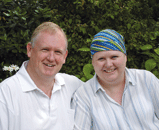- Hot topics
- Join Now!
October 06 Lifestyle
2006-09-08T00:00:00

Breast cancer taught me to live for today
To continue reading, register today for more access!
If you are a member or a registered user, or if you already have a login for another Premier website SIGN IN HERE

Sign up for your free account now!
Registering is quick and easy and gives you immediate access to read more articles, plus:
- You’ll receive a weekly newsletter every Saturday with the top stories of the week
- You can save articles to read later
- You can share your comments and thoughts on the stories
Or become a member today for unlimited access! Special offers are available!
If you already have an account with a Premier website SIGN IN HERE
Related articles
-
 Article
ArticleThe top ten podcast episodes you’re all talking about
2025-03-26T13:16:00Z
We launched the ‘Woman Alive’ podcast in July 2023 and many of you are already regular listeners. After almost two years, here are the ones that have gained the most attention…
-
 Opinion
Opinion‘Football is bringing Christian women together’
2025-02-28T06:17:00Z By Rebekah Walker
‘It strikes me that women choosing to come out on a dark and rainy Monday evening bears huge similarities to choosing faith in God. Amidst the swirling gales of life and the cold isolation of living in a broken world, choosing to take a step into an environment where we praise God for all his goodness is powerful,’ says Rebekah Walker.
-
 Opinion
OpinionGod set me free from the stigma of having a C-section and now I’m just glad my baby is safe
2025-01-22T07:00:00Z By Danielle Finch
‘When our daughter was born, I needed an elective C-section due to placenta praevia. Although far from ‘natural’, Anna’s birth was filled with joy,’ says Danielle Finch.
More from Home
-
 Opinion
OpinionShowing our kids that following Jesus is a great adventure
2021-06-16T00:00:00Z
As we approach Father’s Day, Andy Frost thinks back to how his dad influenced his own Christian journey when he was younger. He also shares details of a great new resource to help fathers as they take their kids on an adventure of faith.
-
 Opinion
OpinionG7: we needed more actionable steps
2021-06-15T00:00:00Z
Lovely Chavan from the Young Christian Climate Network believes the G7 talked about many vital issues, but didn’t provide a clear explanation on what happens next
-
 Opinion
Opinion‘World leaders must stop reiterating empty promises’
2021-06-15T00:00:00Z
Rachel Mander from the Young Christian Climate Network reflects on the recent G7 summit in Cornwall
- Issues
- Topics A-Z
- Writers A-Z
- © 2025 Woman Alive
Site powered by Webvision Cloud






















